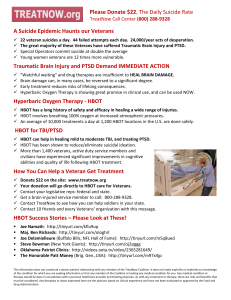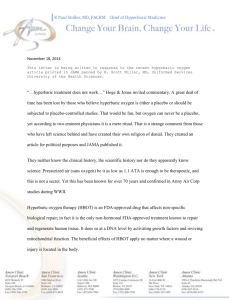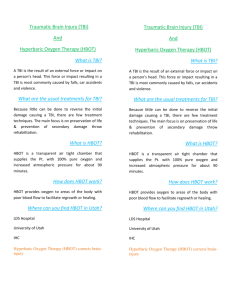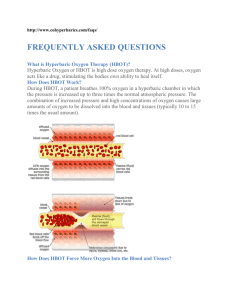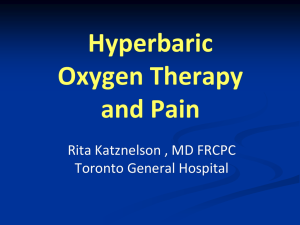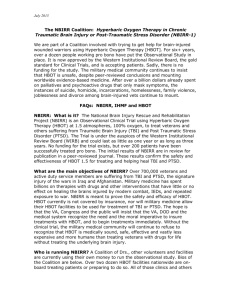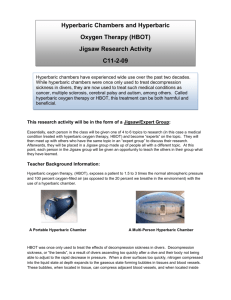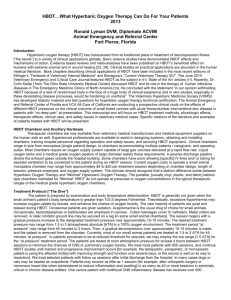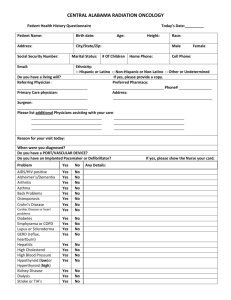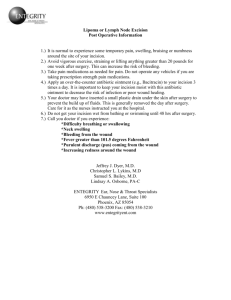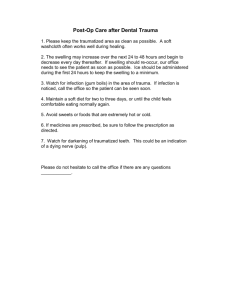swelling doctors
advertisement
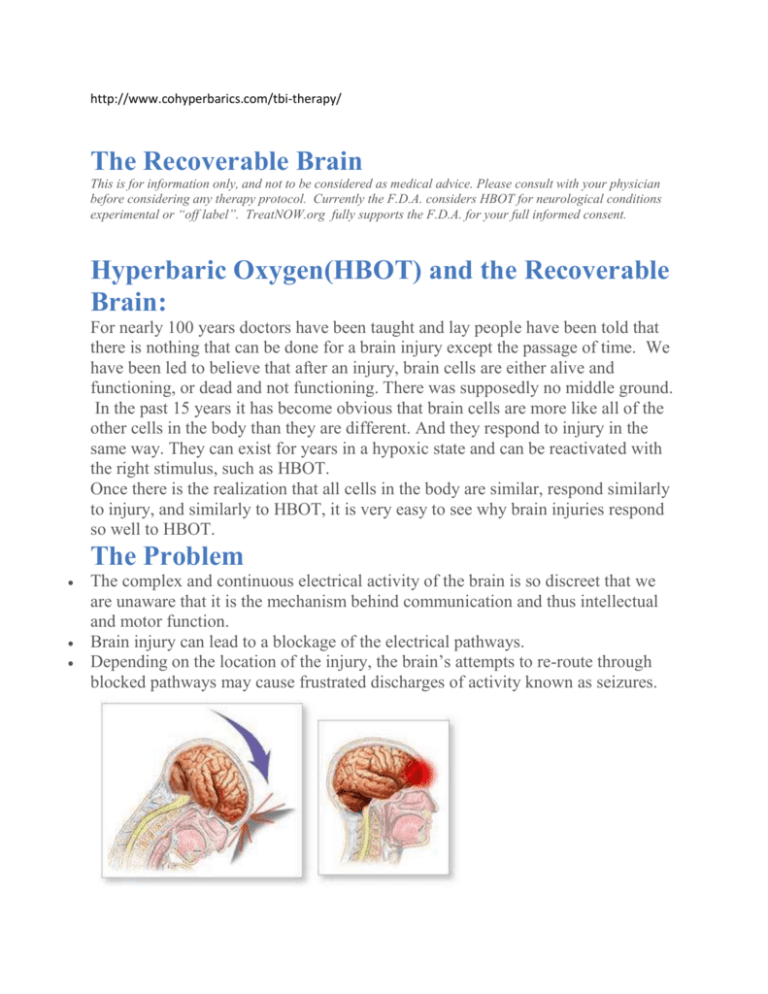
http://www.cohyperbarics.com/tbi-therapy/ TBI Therapy The Recoverable Brain This is for information only, and not to be considered as medical advice. Please consult with your physician before considering any therapy protocol. Currently the F.D.A. considers HBOT for neurological conditions experimental or “off label”. TreatNOW.org fully supports the F.D.A. for your full informed consent. Hyperbaric Oxygen(HBOT) and the Recoverable Brain: For nearly 100 years doctors have been taught and lay people have been told that there is nothing that can be done for a brain injury except the passage of time. We have been led to believe that after an injury, brain cells are either alive and functioning, or dead and not functioning. There was supposedly no middle ground. In the past 15 years it has become obvious that brain cells are more like all of the other cells in the body than they are different. And they respond to injury in the same way. They can exist for years in a hypoxic state and can be reactivated with the right stimulus, such as HBOT. Once there is the realization that all cells in the body are similar, respond similarly to injury, and similarly to HBOT, it is very easy to see why brain injuries respond so well to HBOT. The Problem The complex and continuous electrical activity of the brain is so discreet that we are unaware that it is the mechanism behind communication and thus intellectual and motor function. Brain injury can lead to a blockage of the electrical pathways. Depending on the location of the injury, the brain’s attempts to re-route through blocked pathways may cause frustrated discharges of activity known as seizures. What Causes the Blockage? SPECT scans (computerized brain mapping) and fMRI show that not only does brain injury produce cell death, it also reduces essential blood flow to a wider area of brain tissue surrounding the dead cells, where signal re-routing might be expected to take place. How Does This Happen? Following a brain injury, many blood capillaries around the area of cell death become torn open The liquid part of the blood (the plasma) then leaks out causing a swelling that may be very extensive. This reduces cerebral blood flow in the affected areas Reduction in blood flow means a reduction of essential nutrition (most vitally oxygen), and a build up of waste products from local biochemical reactions (e.g. lactate and calcium), which shut down normal cell function and further block pathways Why Doesn’t Capillary Healing Happen? If the capillaries are to heal, they desperately need oxygen. Unfortunately, the tiny tubules leading to the torn capillaries become constricted because of the damage. This means that the Red Blood Cells needed to bring the healing oxygen are too big to get through and simply get stuck in the “pipes.” Thus the plasma that is normally very low in oxygen continues to pour out, maintaining the swelling with all its attendant problems which, if left unattended, would last for years, even an entire life time. Traumatic Brain Injury The brain is similar to a large spear of broccoli. The broccoli fronds are like the outer part of the brain, the cortex or grey matter, where the brain cells exist and the spear or stalk is like the connecting tracts in the center of the brain. These tracts are also known as the white matter. Trauma causes an injury to the brain that is mechanistically identical to shaking the broccoli by its stalk. The shaking causes a mechanical disruption of the connecting tracts between brain cells. These tracts are similar to the cable that carries our cable television and broadband. Once disrupted cells can’t communicate between themselves some of the cables die. Each cable that is lost causes a loss of neurological function and/or cognitive function. In addition, each microscopic site of neuron disruption or blood vessel trauma is a wound in the brain that immediately starts the inflammatory reaction. It is also associated with swelling, just like a swollen ankle or a bruise on the arm. As swelling occurs the fluid compresses the small blood vessels in the area leading to low blood flow and low oxygen. Nearby cells then are further injured and cause the function to diminish or even die. This is known as the “vicious cycle” of traumatic brain injury. The net result is loss of neurological function and symptoms such as headache, confusion, problems with memory, attention, concentration, sleep disturbance, irritability, etc. How HBOT Works For Traumatic Brain Injury HBOT has been shown to decrease swelling, repair the metabolic injury to the neuron cells, and stop the inflammation in acute brain injuries with just a few treatments in the first 72 hours after injury. It is the only drug known to break the vicious cycle. Once the vicious cycle is broken neurological function is restored and patients survive. If HBOT is not used early on in traumatic injury the injury “matures” as inflammation runs its course. Inflammation is “stereotypic” or identical regardless of where in the body it occurs. It is the same process, the same story every time, everywhere. The net result is nearly identical chronic wounds by the time the wound is 6 months to 1 year old. The wound, at this point, resembles any other wound in the body. A chronic wound that HBOT has been already been proven effective in treating. . Stroke as a Brain Injury: HBOT may offer many people the chance to improve or reverse some stroke symptoms if the damage, which has been done, is not severe or in critical areas. The majority of strokes are caused by blood vessel obstructions, such as blood clots, that cut off blood and oxygen to parts of the brain. This is called an ischemic stroke, and results in the death of brain cells if the flow of blood is not restored within a few minutes. The localized non-functioning area in the brain is called an infarct. Previously healthy tissues surrounding the infarct also start to become hypoxic; this are surrounding the infarct is referred to as the ischemic penumbra. The ischemic penumbra contains dormant or idling neurons, brain cells that are nonfunctional but intact. The disabilities that ensue depend upon what area of the brain has been affected. Symptoms may include paralysis on one side of the body and spasticity. This type of brain injury can reduce mobility, speech, and swallowing ability. It can also create mental difficulties, memory loss and personality changes. HBOT for Stroke Recovery With the use of HBOT, the dormant neurons in the ischemic penumbra can restore their metabolism and function and the patient can sometimes make a significant recovery. Often times, one part of the brain can take over the function of another part of the brain. The brain then starts to sort out and reorganize function. This ability to switch functions and reorganize is call plasticity. Some people may have spontaneous improvement and if the damage is not severe can recover partial if not all their function on their own. HBOT is used to ensures that optimal healing to the idling, intact brain cells take place. This can offer a more optimistic outlook for stroke patients as they see quicker and more profound recovery early on. HBOT decreases swelling in brain tissues, relieves oxygen starvation known as hypoxia, improves micro-circulation and reduces spasticity. The improvements seen in patients have been reproduced in hyperbaric centers worldwide. Skeptical physicians who have followed their stroke patient’s recovery using HBOT, soon become convinced of the positive physiological changes their patients have undergone. Positive effects using HBOT have been recorded in many studies worldwide. Whether a patient is seen within the first 24 hours after a stroke or 10 years later, recovery of non functioning dormant cells has been seen. HBOT does not resurrect dead neurons, but it does assist the wound healing capabilities in the brain which is not available with any other form of therapy. The oxygenated neurons gradually reconnect to the rest of the brain helping to return the use of lost cognitive and motor functions. TreatNOW.org wishes to thank TBI Therapy, and the founder, Dr. John Hughes, D.O. He treats traumatic brain injury (TBI) patients using hyperbaric oxygen therapy (HBOT) and adult stem cells. The procedures and protocols used at TBI Therapy are patent pending, uniquely sophisticated, presently scarce, and at the cutting edge of neuro-regenerative medicine. The important message is that TBI and Concussions are treatable and have been for decades. See: http://www.aspenintegrativemedicine.com/
